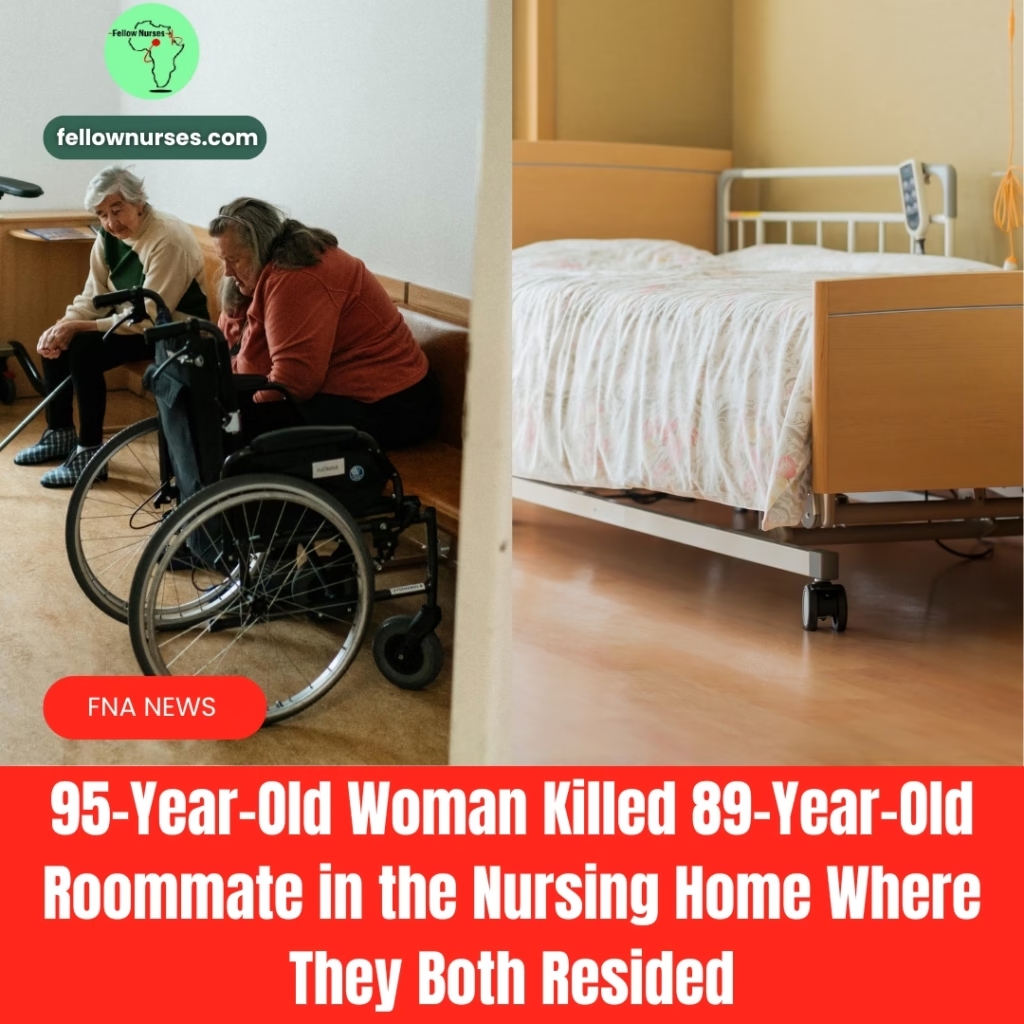Fellow Nurses Africa | Lagos, Nigeria | 27 September, 2025

A 95-year-old woman with dementia allegedly killed her Holocaust survivor roommate in what experts call a wake-up call for America’s aging care system
The call came in at 10:27 p.m. on September 14th just another Sunday night emergency at the Seagate Rehabilitation and Nursing Center in Coney Island.
But what responders found would expose the dangerous reality lurking behind the doors of America’s understaffed nursing homes.
Nina Kravtsov, 89, lay dying from blunt force trauma to the head. Her alleged attacker? Her 95-year-old roommate, Galina Smirnova, who nurses discovered in the bathroom washing blood from her hands and hospital gown.
The murder weapon wasn’t a knife or gun—it was a leg rest from Smirnova’s own wheelchair, later found discarded outside the facility like evidence from a crime scene no one saw coming. In the hands of a 95-year-old woman with dementia, this everyday mobility aid became an instrument of death.
Kravtsov, a Holocaust survivor who had escaped the horrors of Nazi-occupied Ukraine only to die at the hands of her roommate in what should have been her sanctuary, was pronounced dead at 5:39 a.m. the following morning.
Here lies the heart-wrenching complexity of this case: Smirnova, now facing second-degree murder charges and held without bail at Rikers Island, suffers from dementia, a disease that can transform familiar faces into perceived threats and peaceful moments into episodes of confusion and violence.
“This case represents one of our most challenging scenarios in elder care,” explains Dr. Sarah Mitchell, a geriatrician specializing in dementia care. “When cognitive decline meets institutional living, the results can be catastrophic for everyone involved.”
The question haunting investigators and families alike: How do you hold someone accountable for actions their diseased mind may not have understood?
The Seagate incident exposes critical gaps in America’s nursing home infrastructure. With over 1.3 million Americans residing in nursing homes – many with varying degrees of cognitive impairment, the challenge of keeping residents safe from each other has never been more pressing.
Industry experts point to chronic understaffing as a contributing factor.
“You can’t have one nurse monitoring 30+ residents, especially when some have behavioral issues related to dementia,”
says Maria Rodriguez, a former nursing home administrator.
“Something has to give, and tragically, it’s often resident safety.”
Smirnova’s case presents prosecutors with an unprecedented challenge. At 95 and suffering from dementia, questions about her mental competency to stand trial loom large. Her not-guilty plea, entered during her Wednesday arraignment, sets the stage for what could become a landmark case in geriatric criminal justice.
Legal experts suggest the outcome could reshape how the justice system handles crimes committed by defendants with severe cognitive impairment. “This isn’t just about one tragic night,” says criminal defense attorney James Chen. “This is about how we as a society balance accountability with compassion for those whose minds are no longer their own.”
The tragedy has sent shockwaves through Brooklyn’s tight-knit Russian-speaking community, where both women had roots. Kravtsov’s death represents not just the loss of a life, but the silencing of a witness to history, another Holocaust survivor’s voice forever stilled.
Your journey to excellence starts here. 🌍💉
For families across America with loved ones in nursing homes, the incident raises uncomfortable questions: Are our most vulnerable citizens truly safe? What happens when the people meant to be protected become the threat?
As Smirnova awaits her next court appearance from her cell at Rikers Island, the broader implications of this case continue to unfold.
Nursing home advocacy groups are calling for enhanced screening protocols, better staff training for dementia-related behavioral issues, and increased funding for specialized memory care units.
The Seagate facility has declined to comment on specific security measures, citing the ongoing investigation. But the silence speaks volumes about an industry struggling to balance the competing demands of compassionate care and institutional safety.
As this case moves through the courts, several critical questions demand answers:
- How can nursing homes better assess and manage residents with behavioral symptoms of dementia?
- What level of supervision is adequate when pairing elderly roommates with cognitive impairments?
- How should the justice system handle crimes committed by defendants whose mental capacity is severely compromised?
The answers to these questions won’t bring Nina Kravtsov back, nor will they erase the tragedy that has forever changed two families and one community. But they might prevent the next Sunday night phone call that no nursing home ever wants to receive.
In the end, this case serves as a reminder that behind every institutional policy and procedural manual are real people, fragile, vulnerable, and deserving of protection from dangers they may not even recognize, including those sleeping in the bed next to them.
The case against Galina Smirnova continues to develop. She faces charges of second-degree murder and fourth-degree criminal possession of a weapon. Her next court appearance has not yet been scheduled.
🚨 Stay Ahead in Nursing! 🚨 Be the first to see breaking nursing news, access career support, and unlock exclusive opportunities.
Your journey to excellence starts here. 🌍💉
Fellow Nurses Africa is the independent voice of African Nurses. We educate, inform and support the nursing profession.










